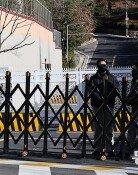SMEs impacted by the aftermath of martial law
SMEs impacted by the aftermath of martial law
Posted December. 23, 2024 07:57,
Updated December. 23, 2024 07:57
Small and medium-sized businesses suffering from a prolonged economic downturn and low-price competition from China are severely impacted by the recent martial law outbreak. Representatives of small and medium-sized businesses interviewed by The Dong-A Ilbo criticized the situation, claiming that “the business climate has grown more unfavorable than the Asian foreign exchange crisis” or that “the pandemic circumstances had been better.” A textile processing company in Seongseo Industrial Complex in Daegu lost orders from overseas customers after the martial law outbreak on Dec. 3, and a toy company in Hwaseong, Gyeonggi Province, has 1.8 billion won worth of molds in inventory.
In a recent survey conducted by the Korea Federation of Small and Medium Businesses on 513 exporting SMEs, 26% said they had suffered direct or indirect damage due to domestic political chaos. Nearly half of the damage was caused by overseas business partners delaying, canceling, or reducing contracts due to the unstable political situation in Korea. An increasing number of companies are becoming concerned about a liquidity crisis, following halted operations and penalties paid to suppliers. Companies susceptible to exchange rate fluctuation have grown helpless amidst the strengthening U.S. dollar, which has surpassed 1,450 won to one dollar in 15 years since the financial crisis.
SMEs have already struggled with soaring labor costs and raw material prices due to overwhelming competition by ultra-low-priced Chinese products, sluggish domestic demand, and slowing exports. The number of factories put up for auction in October of this year was the highest in three years and seven months, and the number of companies, mainly small and medium-sized enterprises, that filed for bankruptcy through October of this year also exceeded the all-time high on an annual basis. There are also concerns that the collapse of small and medium-sized businesses will accelerate due to the political confusion caused by martial law and impeachment.
SMEs are the backbone of the Korean economy, accounting for 99% of all companies and more than 80% of employment. The impact on SMEs will result in more significant damage to the local economy, employment, and even a recession. That is why it is necessary to quickly lift industry regulations, such as working hour restrictions, and develop measures to actively support companies experiencing a temporary liquidity crisis. We should pay close attention to the warning that continued inaction would not only result in recession but undermine the industrial ecosystem.
Headline News
- Pres. Yoon refuses impeachment documents for a week
- Debate over Lee’s participation causes friction in government consultative body
- Food and dining prices could increase en masse next year
- Foreign couple borrowed over $2 million to buy a Seoul house
- One-third of Japanese companies keep workers employed until 70







